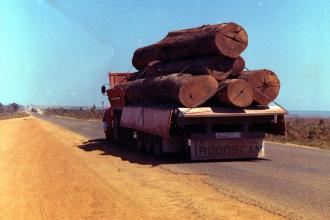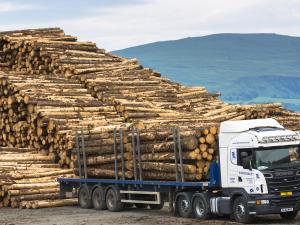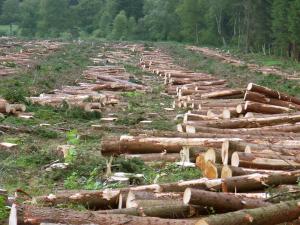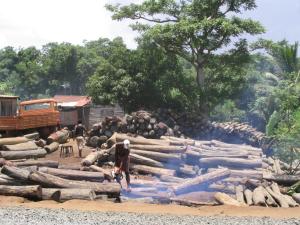
Brazil is one of the most biologically diverse countries in the world. What is less known is that the country is the fourth largest industrial roundwood (timber left as logs, not sawn into planks) and wood pulp producer and ninth largest paper producer in the world. Brazil’s forest sector contributed 5 percent to the national gross domestic product in 2012. Brazil’s forests are not only home to communities and a haven for biodiversity, they are also part of the country’s economic backbone.
Brazil’s government has made impressive progress towards balancing forest protection and production. In 2012, deforestation in the Brazilian Amazon dropped to its lowest rate in more than two decades. Brazil’s National Institute for Space Research has pioneered the use of satellite data to prevent illegal logging. And the forest sector uses the Forest Source Document system (Documento de Origem Florestal, DOF), a sophisticated electronic system to track the wood flow throughout the supply chain.
Despite these positive steps, illegal logging and associated trade in the Amazon continues. Beyond the negative social and environmental impacts, illegal logging poses a serious problem for businesses producing legal wood products. With a price difference of up to 40 percent, legal wood simply cannot compete with cheaper illegal wood.
To reduce illegal logging and support the legal actors in the forest sector, Brazil must strengthen its forest control systems and policies.
The root of the problem
The problem of illegal logging in Brazil is complex. Illegal logging often reflects deeper unresolved governance issues such as contradicting public policies, land tenure issues and corruption. In Brazil’s case, a combination of well-intended but flawed policies and control systems contribute to market conditions that, in fact, favor illegal logging. Some of the issues include:
- Abuse of the Forest Source Document system (DOF): The DOF tracks and cross checks timber harvested from a forest operation against the volume of timber approved by the government under the forest management plan. As loggers extract timber, the DOF deducts the volume as “timber credits” from the authorized amount. Unfortunately, illegal “ghost businesses” will sometimes use false forest management plans and false timber credits to legalize illegal woods. This is done through false forest management plans and false timber credits, crediting wood to the incorrect management plan, or overusing approved management plans.
- Lack of transparency and coordination: Law enforcement in the forest sector is divided between the Brazilian Institute of the Environment and Renewable Natural Resources (Ibama), the Brazilian Forest Service, the state environment agencies, and the Office of the Federal Prosecutor. Communication and coordination is not always optimal, and often the DOFs (controlled by the States) are not compatible to track the wood as the wood moves from state to state.
- Bureaucratic bottlenecks: Today, Brazilian timber businesses must comply with a multitude of rules that vary depending on the forest property, forest type and form of operation. Obtaining a license can sometimes take over a year. These rules constrict business development and provide opportunities for abuse and corruption.
- High taxes: The tax system favors small businesses by offering them lower rates. These tax policies discourage operators from consolidating or formalizing their business operations and spur illegal logging. The results of these policies are a high number of small operations, with high degree of informality, and low capacity to operate as business (see the forthcoming “Roundtable on Sustainable Tropical Timber”, from FGV, 2013).
In the current system, businesses that play by the rules are at a disadvantage. Competition with cheaper illegal wood and compliance with higher taxes and cumbersome bureaucratic procedures hurts the growth of the legitimate operations. These issues need to be addressed to favor legal businesses and allow them to compete in domestic and international markets that are increasingly demanding wood products of legal origin through policy instruments such as the State of Sao Paulo’s public procurement policy (Cadmadeira), the U.S. Lacey Act, the European Timber Regulation and the Australian Illegal Logging Prohibition.
Over the past year, private actors and civil society organizations in Brazil have begun a conversation about common problems and possible solutions to the illegal logging challenge. Earlier this year, the group Fundaçao Getulio Vargas(with support from Rede Amigos da Amazônia), WWF-Brasil and Traffic launched a series of roundtables to facilitate a multi-stakeholder process that seeks to encourage legality. Earlier this week, the second roundtable took place to develop a set of solutions to propose to the government. To support these efforts, the Forest Legality Alliance is hosting an event to discuss the international and domestic demands for forest products, and how new technologies can help improve wood supply chain systems in Brazil and other Amazon-basin countries.
The success of this process will depend on the forest sector articulating solutions with a united voice. With sufficient cooperation and improved policies, Brazil could truly become a leader in the legal and sustainable trade in forest products.
For more details on the roundtables, click here.


